 author
authorArthur Koestler
Arthur Koestler, CBE, was a Hungarian-born author and journalist. Koestler was born in Budapest and, apart from his early school years, was educated in Austria. In 1931, Koestler joined the Communist Party of Germany, but he resigned in 1938 after becoming disillusioned with Stalinism. Having moved to Britain in 1940, he published his novel Darkness at Noon, an anti-totalitarian work that gained him international fame. Over the next 43 years, Koestler espoused many political causes and wrote novels, memoirs, biographies, and numerous essays.
In 1949, Koestler began secretly working with a British Cold War anti-communist propaganda department known as the Information Research Department (IRD), which would republish and distribute many of his works and also fund his activities. In 1968, he was awarded the Sonning Prize "for [his] outstanding contribution to European culture." In 1972 he was made a Commander of the Order of the British Empire (CBE).In 1976, he was diagnosed with Parkinson's disease, and in 1979, with terminal leukemia. On March 1, 1983, Koestler and his wife Cynthia took their lives at their London home by swallowing lethal quantities of barbiturate-based Tuinal capsules.
Koestler was born in Budapest to Jewish parents Henrik and Adele Koestler (née Jeiteles). He was an only child. His father, Henrik Koestler, was born on 18 August 1869 in the town of Miskolc in northeastern Hungary. His paternal grandfather Lipót Koestler was a soldier in the Austro-Hungarian Army. In 1861 he married Karolina Schon, the daughter of a prosperous timber merchant. Their son Henrik was born several years later. Henrik left school at age 16 and took a job as an errand boy with a firm of drapers. He taught himself English, German, and French and eventually became a partner in the firm. He set up his own business importing textiles into Hungary.
Arthur's mother, Adele Jeiteles, was born on 25 June 1871 into a prominent Jewish family in Prague. Among her ancestors was Jonas Mischel Loeb Jeitteles, a prominent 18th-century physician and essayist whose son Juda Jeitteles became a well-known poet. Beethoven set some of his poems to music. Adele's father, Jacob Jeiteles, moved the family to Vienna, where she grew up in relative prosperity until about 1890. Faced with financial difficulties, her father abandoned his wife and daughter and emigrated to the United States.
Adele and her mother moved from Vienna to Budapest to stay with Adele's older married sister. Although Koestler "liked later to claim his family had flared up from nothing into sudden wealth and then vanished just as fast into exile or the gas chambers... It wasn't true: his mother was from one of the richest Jewish families in Austro-Hungary." Henrik Koestler met Adele in 1898 and married her in 1900. Arthur, their only child, was born on 5 September 1905. The Koestlers lived in spacious, well-furnished, rented apartments in various predominantly Jewish districts of Budapest.
During Arthur's early years, they employed a cook/housekeeper as well as a foreign governess. His primary school education started at an experimental private kindergarten founded by Laura Striker (née Polányi). Her daughter Eva Striker later became Koestler's lover, and they remained friends all his life. The outbreak of World War I in 1914 deprived Koestler's father of foreign suppliers, and his business collapsed. Facing destitution, the family moved temporarily to a boarding house in Vienna. When the war ended, the family returned to Budapest.
As noted in Koestler's autobiography, he and his family were sympathetic to the short-lived Hungarian Bolshevik Revolution of 1919. Though the small soap factory owned at the time by Koestler's father was nationalized, the elder Koestler was appointed its director by the revolutionary government and was well-paid. Even though the autobiography was published in 1953, after Koestler had become an outspoken anti-Communist, he wrote favorably of the Hungarian Communists and their leader Béla Kun. He fondly recalled the hopes for a better future he had felt as a teenager in revolutionary Budapest.
Later the Koestlers witnessed the temporary occupation of Budapest by the Romanian Army and then the White Terror under the right-wing regime of Admiral Horthy. In 1920 the family returned to Vienna, where Henrik set up a successful new import business. In September 1922, Arthur enrolled in the Vienna Polytechnic University to study engineering and joined a Zionist dueling student fraternity, 'Unitas.'. When Henrik's latest business failed, Koestler stopped attending lectures and was expelled for non-payment of fees.
In March 1926, he wrote a letter to his parents telling them that he was going to Mandate Palestine for a year to work as an assistant engineer in a factory in order to gain experience to help him obtain a job in Austria. On 1 April 1926, he left Vienna for Palestine.
Best author’s book

























